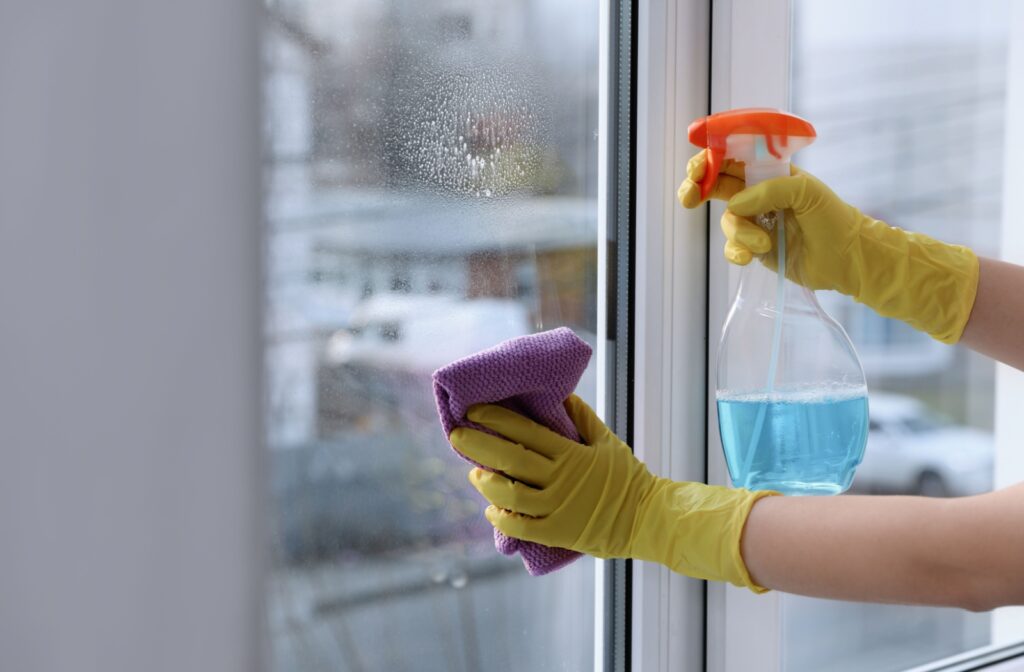When eyeglasses become smudged or streaked, it’s natural to reach for the nearest cleaner, which often means Windex. Windex is a common household product that works well on windows and mirrors, so it may seem like a practical choice for eyewear.
Eyeglass lenses are far more delicate than glass panes, and using Windex can lead to damage over time. So no, you cannot clean eyeglasses with Windex.
Modern lenses are made from materials like polycarbonate or high-index plastic. While Windex may clean glass effectively, it contains chemicals, particularly ammonia, that can break down these coatings. That can lead to peeling, discoloration, or a cloudy appearance that makes lenses harder to see through.
What’s in Windex & Why It’s Harmful to Lenses
The Role of Ammonia in Household Cleaners
Windex and similar glass cleaners often contain ammonia, which cuts through dirt and grease on hard surfaces. On window glass or bathroom mirrors, it’s effective, but eyeglass lenses are engineered with coatings that respond poorly to such harsh ingredients.
Using ammonia-based cleaners can:
- Degrade anti-reflective or UV coatings
- Weaken scratch-resistant layers
- Cause permanent streaks or cloudiness over time
Eyeglasses aren’t just plastic or glass; they’re precision devices. Regular exposure to Windex may strip away the very coatings that help lenses perform effectively.
How Frames React to Harsh Cleaners
Eyeglass frames also come in a wide variety of materials, including acetate, metal alloys, and titanium. Many of these materials are coated or painted. Harsh cleaning agents can corrode the metal or wear down the surface finish of plastic frames, leading to flaking, dullness, or brittleness.
Exposure to strong chemical cleaners can also weaken the frame’s structural integrity. Hinges, nose pads, and even lens grooves may be affected, increasing the risk of breakage or misalignment.
Safer Alternatives to Windex for Cleaning Glasses
Gentle Cleaning Can Still Be Effective
Eyeglasses don’t require aggressive chemicals to stay clean. A simple cleaning routine using mild products can protect lenses and extend their lifespan.
A safe cleaning process often includes:
- Rinsing lenses under lukewarm water to remove debris
- Applying a small amount of lotion-free dish soap
- Rubbing gently with clean fingertips
- Rinsing thoroughly and drying with a microfiber cloth
Microfiber cloths are specifically made to lift away oils and particles without scratching the lens surface. This method avoids buildup and keeps coatings intact.

What to Avoid When Cleaning Your Glasses
Common Mistakes That Damage Lenses
It’s easy to fall into habits that feel convenient but can damage eyewear over time. People often clean their lenses with whatever’s within reach; paper towels, tissues, napkins, or even the edge of a shirt. Unfortunately, these materials can cause micro-abrasions that wear down lens coatings.
Other cleaning missteps to avoid include:
- Using alcohol or vinegar-based products
- Spraying cleaning solutions directly on lenses without rinsing first
- Wiping lenses while they’re dry and dusty
- Using hot water, which can warp certain lenses or coatings
Proper lens care isn’t only about cleaning, but also about choosing safe materials and methods.
When You Need More Than Daily Cleaning
In-Office Deep Cleaning Services
For those who wear their glasses daily or in high-exposure environments, professional cleaning can be a helpful part of routine maintenance. Many optometry offices offer ultrasonic cleaning, which removes grime from lenses, frame joints, and hard-to-reach areas.
Professional cleanings may be useful if:
- Dirt collects in the hinges or around nose pads
- Oil and residue build up despite daily cleaning
- Lenses feel greasy or hazy even after wiping
These services are gentle, non-abrasive, and often available during annual eye exams.
The Case for Consistent Eyewear Care
Long-Term Benefits of Proper Cleaning Habits
Taking the time to clean eyeglasses properly helps maintain their visual clarity and comfort. It also protects your investment, which can be especially important when it comes to prescription lenses or specialty coatings. Clean lenses can provide sharper vision, reduce glare, and support better eye comfort throughout the day.
Establishing a regular routine helps prevent buildup and extends the life of both lenses and frames. It also reduces the likelihood of needing replacements due to avoidable damage.
Benefits of proper care include:
- Fewer surface scratches over time
- Better performance from anti-reflective or blue light coatings
- Lower risk of skin irritation from dirty nose pads or frames
Even a small daily routine, like a gentle rinse and wipe, can make a big difference in how well your glasses serve you.
Choosing Products Designed for Eyewear
What to Look for in a Lens Cleaner
If you want a more portable or convenient solution than dish soap and water, look for lens cleaners specifically formulated for eyeglasses. These are often available at optometry offices and are clearly marked as safe for use with coatings and prescription lenses.
Good eyewear-specific products are typically:
- Free of ammonia and alcohol
- Compatible with anti-reflective coatings
- Paired with a microfiber cloth for gentle application
Avoid generic glass or screen cleaners, which may contain chemicals that damage coatings or leave a residue behind.
Skip the Windex, Protect Your Lenses
Using Windex or other ammonia-based cleaners on eyeglasses may seem harmless, but the long-term effects can include damage to coatings clouding of your lenses. Glasses are a daily tool, and they function best when cared for using safe, appropriate methods.
Choosing the right products and techniques can extend the life of your lenses, preserve the integrity of your frames, and support clear, comfortable vision. If you’re unsure what products are safe to use, stop by the Seal Beach Eyes Optometry office. We’re happy to help you care for your glasses the right way!




